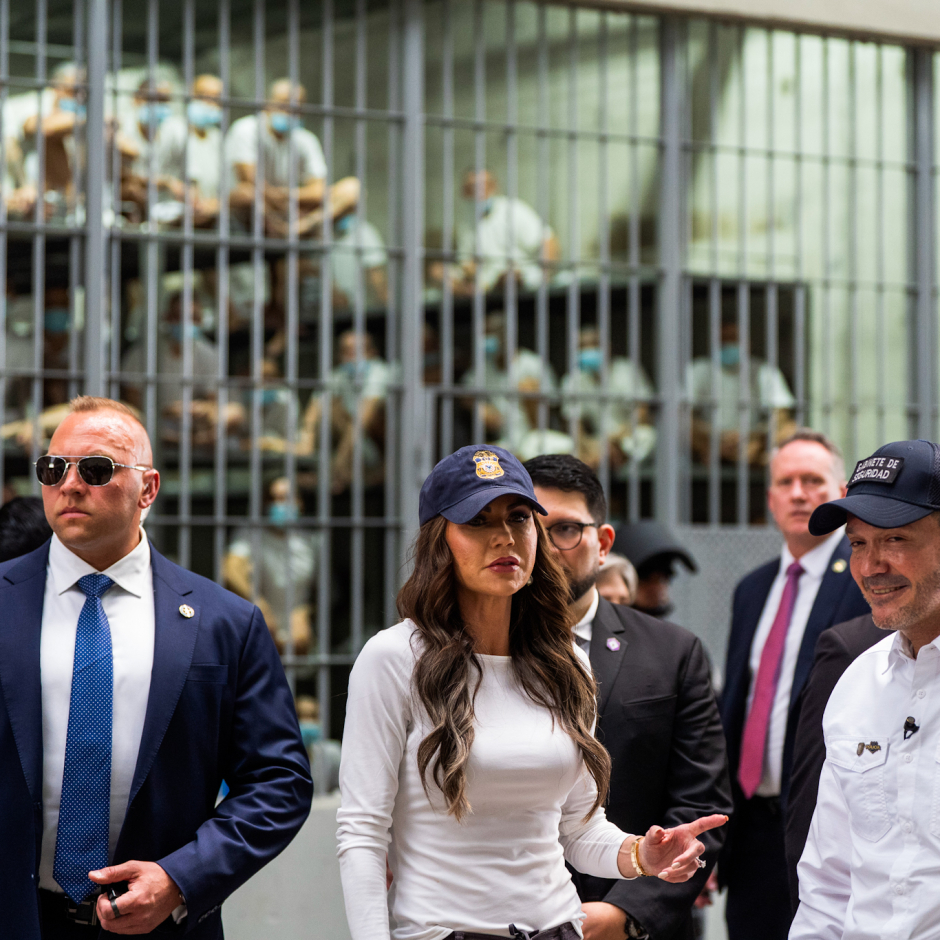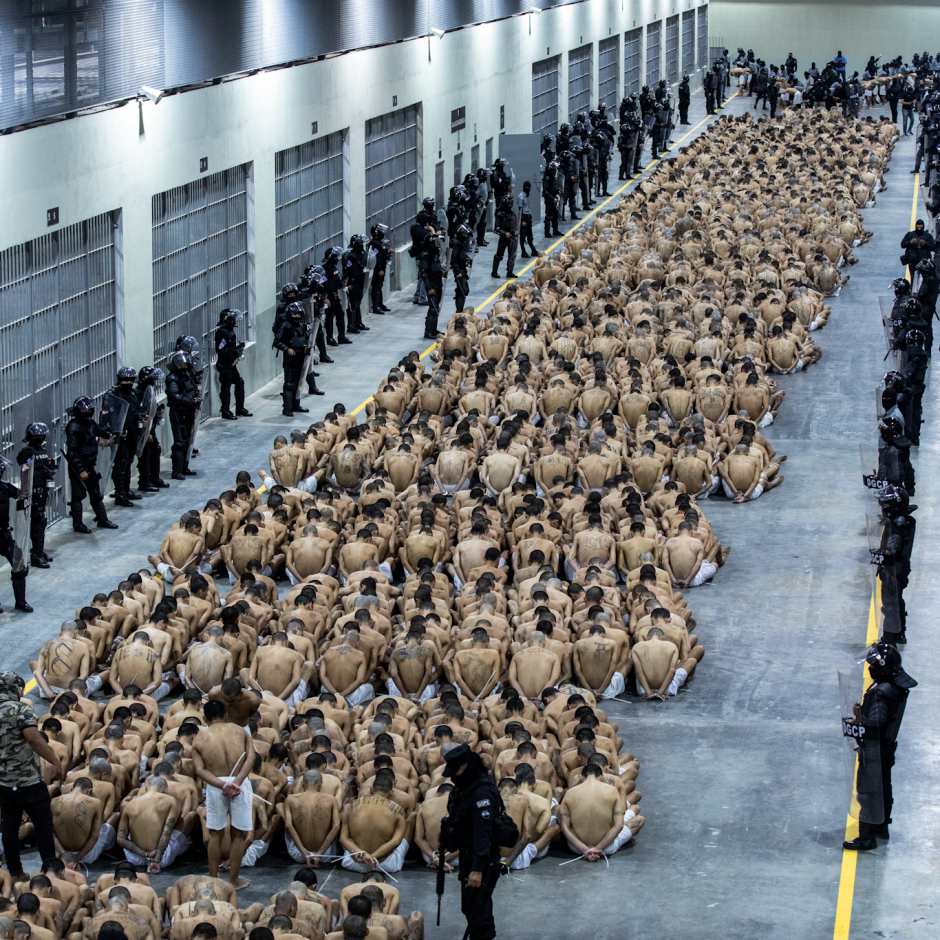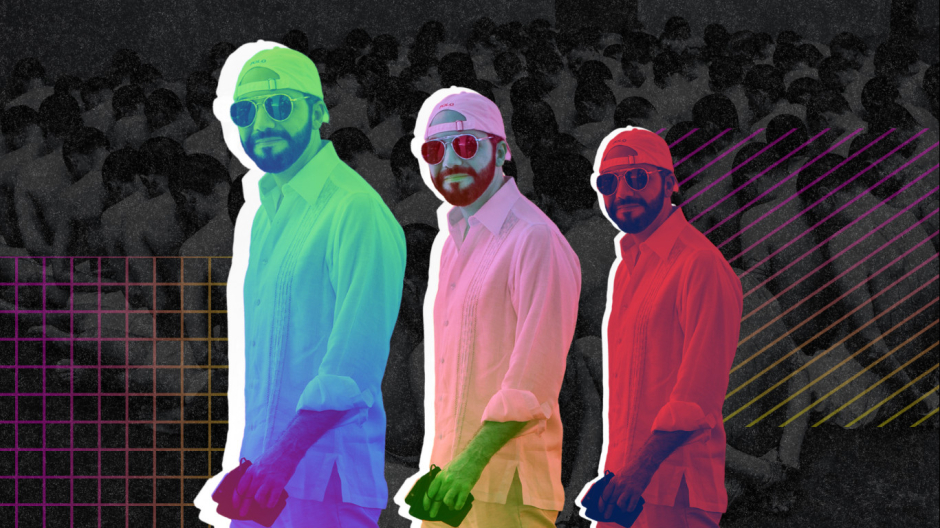Investigation
Nayib Bukele: The Dark Side of the "World's Coolest Dictator"
The Trump administration's deal to send large numbers of people to prisons in El Salvador has thrust its president, Nayib Bukele, into the international spotlight. Bukele has been praised, especially in conservative media, as a dynamic and popular leader who has saved his country from the grips of gang violence. But beneath this polished image, he has cemented his rule based on assigning himself autocratic powers, jailing and persecuting his political opponents, and overseeing the creation and expansion of the world's first prison state. MintPress News explores the dark side of the man who calls himself "the world's coolest dictator."
Cruelty is the Point
The hundreds of migrant detainees the U.S. sent to Central America should be kept in Salvadoran jails "for the rest of their lives," according to Homeland Security Secretary Kristi Noem in an April interview. This is despite the fact that a Bloomberg investigation found that around 90% of those deported have no criminal records or charges against them.
Noem's words reflect an administration eager to find a partner willing to help them outsource America's prison-industrial complex. In February, Salvadoran President Nayib Bukele offered to use El Salvador's sprawling and rapidly growing network of jails to receive thousands of "dangerous American criminals" for a fraction of the cost of detaining them in the United States. "No country has ever made an offer of friendship such as this," said a delighted Secretary of State Marco Rubio, a strong Bukele supporter.
The migrants have been sent to the Terrorism Confinement Center (Centro de Confinamiento del Terrorismo, or CECOT), a $115 million facility widely criticized by human rights groups that opened its doors in October 2023. The 23-hectare site is situated in a rural area of the country, around 70 km (45 miles) from the capital, San Salvador, and is set to house 40,000 people, making it, by quite some margin, the largest prison in world history.
Conditions inside the jail have been widely condemned. Those incarcerated are packed into cells of up to 100 people. Sleeping on metal or concrete bunks, inmates must defecate in front of their cellmates. A 2024 report from the Inter-American Commission on Human Rights found an average of just 0.6 square meters (6.45 square feet) per inmate. Lights are kept on 24 hours a day.

The food is as sparse as the personal space. Detainees are fed just 450 grams of the same meal every day, consisting of beans, pasta and tortillas, along with coffee or another drink. Provided no utensils, they must eat with their hands only.
CECOT offers no outside recreation space, and those inside are allowed only 30 minutes per day out of their cells. Upon arrival, prisoners have their heads shaved, and are often forced to sit close together in formations resembling the conditions on trans-Atlantic slave ships. They are not allowed any contact with their friends, family, or lawyers. Often, the first news a family receives of the whereabouts of their disappeared relative is a note explaining that they have died in prison. The Bukele administration has made clear that they intend to make sure those inside CECOT's walls "will never leave."
The Trump administration had shown little concern for the reported condition at CECOT. In March, Noem herself traveled to the complex to pose in front of dozens of incarcerated people, warning others that they could be next. The Trump administration has justified its move as legal under an obscure law from 1798, and claimed that those deported were members of Tren de Aragua, a Venezuelan criminal group.
Prison Nation
Yet the conditions at CECOT are actually considerably better than at many other Salvadoran jails, as it is one of the few facilities not (yet) overflowing with inmates. In 2022, under the rubric of fighting gang violence, Bukele declared a state of exception, suspending civil liberties and overseeing the arrest and imprisonment of 85,000 people. The prison population has tripled in just a few years, to the point where around 2% of the country's adult population is behind bars-equivalent to roughly seven million Americans.
"El Salvador, under the dictatorship of Nayib Bukele, has overtaken the U.S. as the global leader in incarcerating its own people," Wanda Bertram, a spokesperson for the Prison Policy Initiative, told MintPress News. Today, the country imprisons more than twice as many people per capita as the next highest nation. "As horrific as El Salvador's mass incarceration program is, we shouldn't overlook that it had a clear role model in the United States," she added, pointing out that nearly half of all U.S. adults have an immediate family member who has been incarcerated.
Few of those caught up in Bukele's massive dragnet have had due process. Unable to prove their guilt or connections to MS-13 or other gangs, prosecutors continue to extend their pretrial detentions. Torture is widespread. "It's a system that by design is mistreating and torturing people," said Ana Piquer, Amnesty International's Americas Director. Hundreds have died in custody.
Since he declared the state of exception, Bukele's forces have arrested at least 3,000 children. Far from releasing them, in February, the president signed a bill into law transferring child detainees into adult prisons.
The U.S. government is intimately aware of the nature of Bukele's rule. A 2023 State Department report detailed widespread abuses, including:
[U]nlawful or arbitrary killings; enforced disappearance; torture or cruel, inhuman, or degrading treatment or punishment by security forces; harsh and life-threatening prison conditions; arbitrary arrest or detention; [and] serious problems with the independence of the judiciary."
It also noted that, even before the massive surge in prisoner numbers, conditions inside Bukele's jails were "harsh and life-threatening," and recounted how prison guards beat victims to death and used electric stun guns on the prison's wet floors to deliver shocks to prisoners en masse.
Osiris Luna, the director of El Salvador's prison system, had been sanctioned by the U.S. government for his role in "gross human rights abuses."
Despite the long list of documented abuses, the Trump administration has chosen El Salvador as the location to dump migrants and has promised that this is the beginning of a long partnership between the two nations.
"Salvadoran prisons are the product of the U.S. justice department, Drug Enforcement Agency, and other officials' work in Latin America over the course of the decades. The United States has aided and abetted the construction of these gulags of the Americas. And so, in a lot of ways, Bukele is a monster made in the U.S.," Roberto Lovato, a Salvadoran-American writer and professor at the University of Nevada, Las Vegas, told MintPress News.

"The combination of importing U.S. prison and gang culture with U.S. government-funded digital technology applied to politics is how we get Bukele now," he added. Lovato's 2020 memoir, "Unforgetting: A Memoir of Family, Migration, Gangs, and Revolution in the Americas," explores the relationship of violence between the U.S. and El Salvador.
President Bukele has justified the crackdown as a necessary response to the country's overwhelming organized crime problem, with groups such as MS-13 and Barrio 18 terrorizing the nation. His uncompromising approach has produced results: El Salvador's official murder rate has fallen dramatically, and many say the country's streets are safe again. His policies have certainly gained him significant public backing and praise in the West.
"Nayib Bukele's iron fist has transformed El Salvador," wrote Time magazine, noting he is "arguably the most popular head of state in the world." He also has a fan in billionaire turned government official Elon Musk, who met with him in September, 𝕏 describing him as an "amazing leader." Bukele's achievements, including the drop in homicides, Musk later 𝕏 stated that such policies, "need to happen and will happen in America."
One major issue with this narrative, however, is that as soon as the state of exception was declared, the government began radically undercounting homicides by changing the way deaths were recorded. As Foreign Policy noted, unidentified bodies, or those discovered in mass graves, were no longer classified as homicides, nor were prison homicides, or individuals killed by Bukele's police or security forces, a number known to total in the hundreds.
Persecuting Opponents
El Salvador's youngest president has used these same security forces to attack those who oppose him, such as union leaders and human rights campaigners.
In January, the spokesperson for the Human Rights and Community Defense Union, along with 20 local leaders fighting the eviction of hundreds of families from their land, were arrested and absorbed into the country's sprawling prison network. Public union leaders who organized a protest against the government's failure to pay its workers were also jailed. Likewise, officials and activists from the country's main left-wing political party, the FMLN (in power between 2009 and 2019), are prime targets.
Journalists unwilling to toe the official line have faced scrutiny and persecution. A 2022 report from Citizen Lab and Amnesty International found Pegasus spyware on the devices of dozens of Salvadoran reporters and civil society leaders.
Outlets critical of Bukele have been subjected to costly audits and other legal measures to financially cripple them. In 2023, El Faro, one of the nation's leading outlets, moved its operations to neighboring Costa Rica, citing ongoing threats against its staff. "The dismantling of democracy, the lack of checks and balances on the exercise of power of a small group of people, the attacks against press freedom, and the shuttering of all transparency and accountability mechanisms gravely threaten Salvadorans' right to be informed," its editorial board lamented.
Another potential check on Bukele's power is the judiciary, and the president has taken steps to dismantle it, replacing older judges with loyalists and packing the courts. In 2021, in what was widely described as a "self-coup," he swiftly removed the Attorney General and five judges from the Supreme Court.
With few impediments to his power, Bukele could then concentrate on implementing his agenda of economic shock therapy, which largely consisted of firing tens of thousands of public workers and reducing taxes on the rich and the international business community.
More than 22,000 public sector employees have been laid off in a country of only 6.3 million people. Most of them have not received their legally mandated compensation, and some of those who protested have been arrested.
Bukele has been careful to enrich his backers in El Salvador's business community. Indeed, he has gone so far as to announce his intent to charge municipal governments who do not lower business taxes with "extortion"-a crime usually associated with organized criminal groups. In a country supposedly fighting an all-out war against gangs, the consequences of being labeled as such could be severe.
Another of Bukele's projects is to try to turn El Salvador into a tech hub, building data centers and science parks across the country. To much international fanfare, in 2021, he made Bitcoin legal tender, although it failed to gather significant domestic traction. He has also used social media to carefully craft his image as a maverick risk-taker. Lovato was unimpressed by Bukele's branding, telling MintPress:
El Salvador is a digital dictatorship. It is innovating fascism for the digital age. The country has always been a laboratory for U.S. repression tactics. Both Democrat and Republican administrations would study and experiment with everything from death squads, torture, surveillance technology, and now imprisonment in El Salvador, and then they would bring it back to the U.S."
Made in the USA
Internationally, Bukele has aligned himself with the Trump administration and the global right-wing movement. This has included Israel.
Despite being a member of El Salvador's large Palestinian diaspora, Bukele has made pains to associate himself with Tel Aviv. In 2019, he traveled to Jerusalem to meet with local officials and to be photographed at the Western Wall. And in the wake of the October 7 attack, he 𝕏 described Hamas as "savage beasts" and said that the "best thing that could happen to the Palestinian people is for Hamas to completely disappear."
The conditions that led to El Salvador's poverty and Bukele's rise were intimately shaped by the United States. Throughout the late twentieth century, successive administrations provided the cash, weapons, and training for far-right death squads to rampage throughout Central America, in an attempt to suppress the then-armed FMLN guerrillas.
Trade policies, crafted in Washington, locked El Salvador into a dependent relationship with the U.S., turning the country into a source of cheap labor, where American corporations could outsource poorly-paid jobs, like those in textiles. Predictably, millions of Salvadorans attempted to escape this fate. Two and a half million have moved to the United States. Around half of those living there now are undocumented, meaning that they could be swept up by the very system Bukele is enabling Trump to roll out. Remittances continue to sustain the economy. Furthermore, the insatiable appetite for drugs in the U.S. has left deep scars on the Central American nation, as rival cartels vie for supremacy and control over the lucrative drug trade.
Rather than stop the harm that is triggering it in the first place, Washington's solution to the predictable migrant wave is to militarize the border, using many of the tactics honed by the same death squads it funded in the 1980s.
Perhaps most ominously, the Trump administration is looking to drastically expand the outsourcing of the carceral state to El Salvador, including sending American citizens to the country.
In a meeting between the two presidents in the Oval Office in April, Trump stated that "Home-growns are next. The home-growns. You have got to build about five more places. It [CECOT] is not big enough." Bukele appeared delighted by the proposal. "Yeah, we've got space," he replied.
This development has shocked onlookers. "The U.S. system of mass incarceration is already draconian, oppressive, and racist. Sending U.S. citizens to El Salvador would be an extremely dark turn for an already misguided system," Bertram told MintPress.
"El Salvador serves the U.S. as a laboratory of repression," Lovato said:
Just as the U.S. provided El Salvador with schools of oppression, like the School of the Americas. And now we see what I call the Salvadorization of the United States. The wealth gap between rich and poor has reached Latin American proportions, and even surpassed them. The dismantling of the welfare state, coup attempts, mass imprisonment, counterinsurgency theory and practice, the militarization of the police. The U.S. is becoming a Latin American country in many ways, and therefore, it is having to learn repression techniques from places like El Salvador."
It is, therefore, crucial for those wishing to understand American politics to study the Salvadoran model. "If you want to look to the future of the U.S., you can look at the history of El Salvador, and you can see some of the things that are coming our way now. And we should be signaling red alert," Lovato said.
Feature photo |Illustration by MintPress News
Alan MacLeod is Senior Staff Writer for MintPress News. He completed his PhD in 2017 and has since authored two acclaimed books: Bad News From Venezuela: Twenty Years of Fake News and Misreporting and Propaganda in the Information Age: Still Manufacturing Consent, as well as a number of academic articles. He has also contributed to FAIR.org, The Guardian, Salon, The Grayzone, Jacobin Magazine, and Common Dreams.
Follow Alan on Twitter for more of his work and commentary: @AlanRMacLeod.
